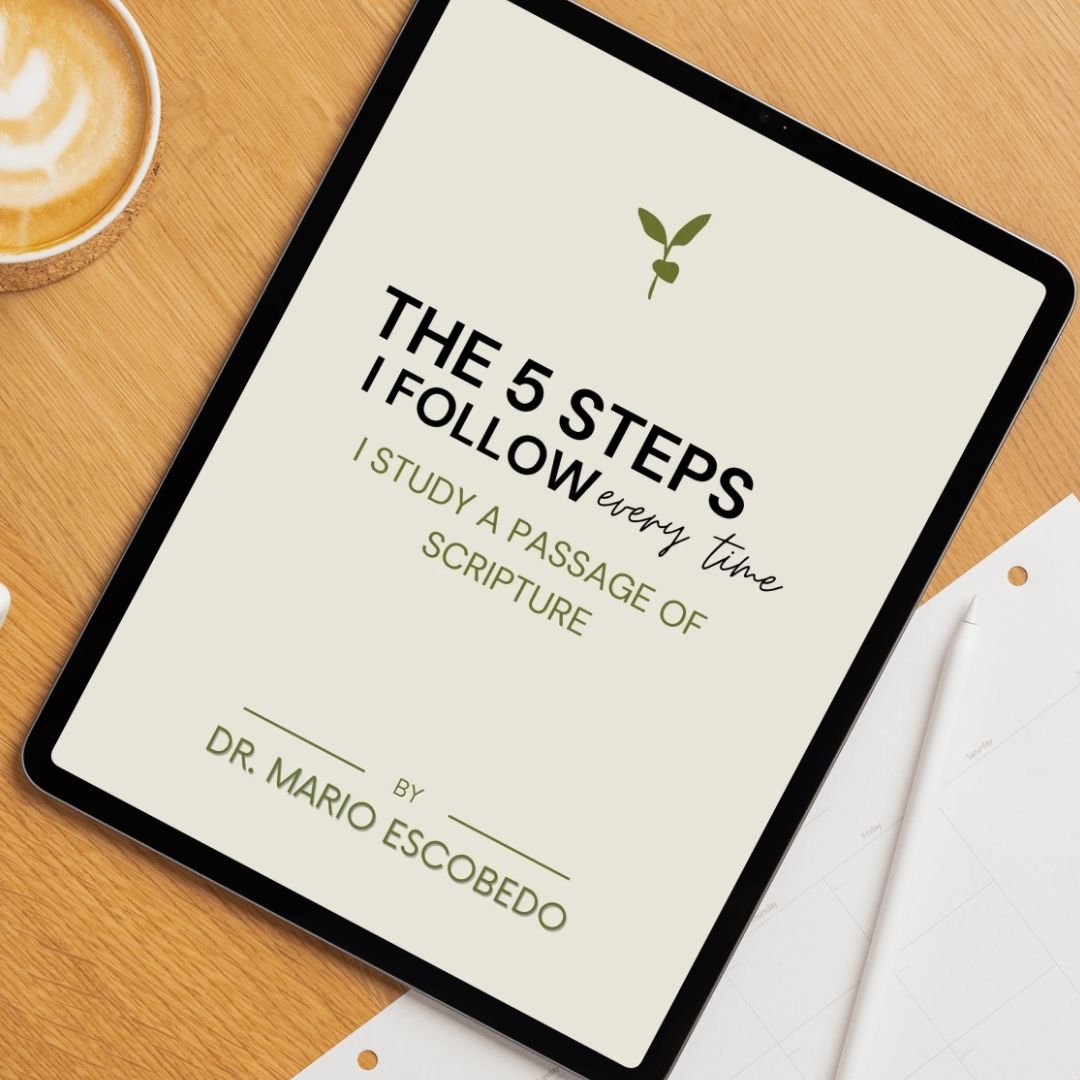Why God Made Samson a Nazarite from Birth
Aug 28, 2025
Audio and video versions of this reflection are available:
I’ve always had a strong interest in the story of Samson.
If you grew up in church, there’s a good chance you do too. As kids in Sunday school, we heard about his incredible strength, his long hair, and his daring feats—ripping apart lions, defeating enemies, and pulling off the kinds of stunts that make for unforgettable Bible lessons.
As a pastor and Bible teacher, I’ve studied and preached from Samson’s story many times. But recently, while reading Judges 13, something new happened. A question popped into my mind that I had never asked before.
I checked several commentaries and didn’t see anyone asking or answering it either. I’m not claiming to be the first or only one to think of it, but in my own study, it felt fresh—and it changed the way I view Samson’s life.
In this post, I want to walk you through that question, my interpretation of it, and what it means for our understanding of Samson’s story—and for our own walk with God.
An Unusual Beginning
Judges 13 opens with a familiar pattern: “The people of Israel again did what was evil in the sight of the LORD, so the LORD gave them into the hand of the Philistines for forty years.”
We’re told there was a man named Manoah from the tribe of Dan, and his wife was barren. In the biblical story, barren women often signaled that something big was about to happen—Sarah, Rebekah, and Rachel were all childless before God intervened.
Then comes the surprise: the angel of the LORD appears, not to Manoah, but to his wife. And He tells her:
“Behold, you are barren and have not borne children, but you shall conceive and bear a son. Therefore be careful and drink no wine or strong drink, and eat nothing unclean.” (Judges 13:3–4, ESV)
The instructions are already unusual—especially the part about avoiding unclean food. Every Israelite was supposed to do that anyway. This suggests, perhaps, that the people of Israel (and maybe even Manoah’s own household) had grown lax in following God’s commands.
But verse 5 is where the real intrigue begins:
“No razor shall come upon his head, for the child shall be a Nazarite to God from the womb, and he shall begin to save Israel from the hand of the Philistines.” (Judges 13:5, ESV)
What Was a Nazarite?
The Nazarite vow is detailed in Numbers 6. It was normally voluntary and temporary—something a man or woman could take on as an act of devotion to God for a specific season.
The vow had three main restrictions:
- No wine or anything from the grapevine (including raisins and grape juice).
- No cutting the hair for the duration of the vow.
- No contact with a dead body—not even for a family member’s funeral.
Usually, a person decided for themselves when to start and end this vow.
But Samson was different. He didn’t choose it. He didn’t even get the chance to agree. God set him apart from the womb—his mother even had to follow Nazarite restrictions during her pregnancy.
This raises the big question that drove my study:
Why would God impose a Nazarite vow on Samson from birth—when no other judge in Israel’s history had this requirement?
Nazarites in the Rest of Scripture
Beyond Numbers 6, the only explicit mention of Nazarites in the Old Testament is in Amos 2:11:
“And I raised up some of your sons for prophets, and some of your young men for Nazarites. Is it not indeed so, O people of Israel?” (ESV)
This is fascinating—God lists Nazarites alongside prophets, suggesting they were a gift to His people. Their very appearance and lifestyle would have been a visible reminder of consecration to God.
If you were an Israelite in Samson’s day and you saw someone with the long hair and distinctive lifestyle of a Nazarite, it would remind you: We are a people set apart to the LORD.
The Big Question: Why Samson?
Other judges—like Gideon, Deborah, and Jephthah—were used by God to deliver Israel without being Nazarites. Clearly, being a Nazarite wasn’t a job requirement for a judge.
And yet Samson’s calling was unique—not even Samuel, who may have had a similar lifelong vow, was explicitly described this way.
So why make Samson a Nazarite from birth?
A Different Kind of Deliverance
In the book of Judges, there’s a cycle:
- Israel sins.
- God sends foreign oppression as discipline.
- Israel cries out for help.
- God raises a judge to deliver them—usually through military victory.
The problem? Military deliverance never produced lasting repentance. As soon as the judge died, the people slipped back into sin.
I believe God wanted something different with Samson. Instead of relying purely on military might, perhaps God intended Samson to lead spiritual reformation—calling Israel back to holiness and covenant faithfulness.
A Nazarite vow from birth would have made Samson’s whole life a visible, living symbol of separation to God. His calling wasn’t just to defeat Philistines—it was to call Israel back to God.
Sadly, Samson never fully embraced that role.
Learning to Live Set Apart
If Samson’s Nazarite calling was meant to be a lifelong picture of consecration to God, then it speaks to us too. You and I may not be under a Nazarite vow, but we are called to live holy, set-apart lives that reflect God’s character.
And that kind of life doesn’t happen by accident. It takes intentional time in God’s Word—studying deeply, not just skimming for quick inspiration.
That’s why I put together a resource for you: my free guide to the 5 steps I follow every time I study a passage of Scripture. These are the same steps I used when digging into Samson’s story, and they can help you move from surface reading to transformative understanding.
👉 Get the free Bible study guide here
Use it for your own study, with your small group, or even in family devotions. Let it help you shape a life of consistent, in-depth engagement with Scripture.
When You Miss Your Assignment
If my theory is right—that Samson’s Nazarite calling was meant to drive a spiritual reformation—then his story is also a tragic example of wasted potential.
Instead of leaning into the separation and holiness symbolized by his vow, Samson lived much like everyone else—often even worse. He pursued Philistine women. He touched dead bodies. He treated his vow lightly.
And while he did achieve military victories, they were often motivated by personal revenge rather than national deliverance or covenant renewal.
It’s possible Samson looked at the other judges before him—military leaders who delivered Israel through battle—and assumed that’s what he was supposed to do too. If so, he may have missed the unique role God had designed for him.
Stay in Your Lane
This is where Samson’s story gets uncomfortably relevant for us.
In God’s Kingdom, every believer has an assignment—ways God has designed and gifted us to serve. The danger comes when we try to copy someone else’s lane instead of running faithfully in our own.
Sometimes we do this because what we see others doing seems more effective, more respected, or more exciting. But if we abandon the unique way God made us in order to fit into someone else’s mold, we risk missing the very work He’s entrusted to us.
Samson’s life warns us: it’s possible to be called, gifted, and empowered by God… and still miss the deepest purpose for which you were created.
My Personal Reflection
I’ve wrestled with this personally. Over the years, I’ve been tempted to scatter my focus—trying to do too many good things, simply because I saw others doing them.
But the older I get, the more I realize how precious and short time is. I want the rest of my ministry to be laser-focused on the things God specifically designed me to do—studying His Word deeply, and helping others grow in their ability to do the same.
That’s why I do a podcast and YouTube videos. That’s why I’m writing posts like this one. Because I know that in-depth Bible study, done consistently over time, is the single most important spiritual discipline for a lifetime of growth.
Your Turn
So here’s my question for you:
- Are you living according to the way God designed you?
- Or are you trying to run someone else’s race?
If you’re not sure, maybe it’s time to step back, pray, and ask the Lord to clarify your lane. Then commit to run in it with all your heart.
And as you do, take Samson’s story to heart—not as just an ancient tale of strength and failure, but as a living reminder that God calls His people to be set apart for His purposes.
Conclusion: The Nazarite Challenge
Samson’s birth was miraculous. His calling was unique. His potential was unmatched. And yet, his story is bittersweet because he never fully embraced the role God gave him.
The challenge for us is to avoid the same mistake. God may not have set you apart as a Nazarite, but He has set you apart in Christ. Your gifts, your opportunities, your relationships—they’re all part of your divine assignment.
Run in your lane. Live set apart. Let your life point others to the God who calls, equips, and redeems.
SUBSCRIBE FOR WEEKLY LIFE LESSONS
Lorem ipsum dolor sit amet, metus at rhoncus dapibus, habitasse vitae cubilia odio sed.
We hate SPAM. We will never sell your information, for any reason.


